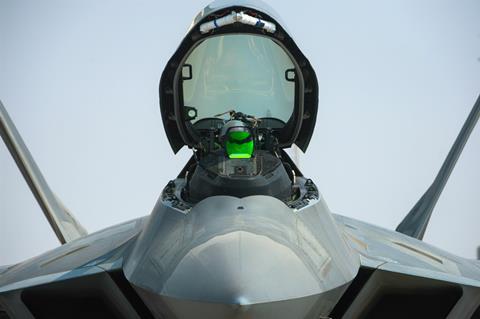For the first time, a fifth-generation combat aircraft has flight-tested onboard software originating from a third-party developer.
The US Air Force (USAF) Air Combat Command (ACC) said on 29 August that test pilots and engineers achieved the milestone on a Lockheed Martin F-22 Raptor.
The USAF describes the moment as ushering in “a new era in Department of Defense software capability development”.

The flight, from Edwards AFB in California, represents the first ever instance of third-party software running on an advanced, fifth-generation fighter, and the first in-flight use of ”open-source container orchestration software” on any fighter aircraft, the USAF says.
Open-source refers to software in which the original source code is made available for distribution and modification. In practice, it allows third-party developers to create new applications for the original platform.
Due to security concerns and the highly-technical nature of their operations, the USAF notes, fifth-generation fighters have historically been unavailable for third-party software integration.
However, the Pentagon in recent years undertook a broad effort to open its long-life-cycle platforms, such as aircraft, to third-party developers – a concept known as a modular open systems approach (MOSA).
The initiative will require thousands of systems acquired by the sprawling Department of Defense procurement system to better work together and be more flexible. A major goal behind MOSA is to enable cheap and rapid integration of new systems to existing platforms. Such a capability is viewed as vital in potential future conflicts.
The US Army has also made MOSA a priority in its Future Vertical Lift initiative to develop the service’s next generation of helicopters.
The goal of the open-source push is to “rapidly discover and iterate on combat capabilities and stay relevant with cutting-edge technology, and affordably accelerate change in delivering combat air force capabilities as an enterprise”, says General Mark Kelly of the ACC.
The USAF team used an open-source architecture known as Open Systems Enclave (OSE), which allowed the combining of government-owned software with existing hardware already aboard F-22s.
“This breakthrough fundamentally changes how we can deliver combat capability to the warfighter,” says Major Allen Black, F-22 test pilot and project co-lead.
The USAF says the feat demonstrates that new technologies can be integrated with existing platforms in less than 60 days.
“We’ve proven the ability to rapidly evaluate and integrate next-generation technologies developed by experts in government, industry and academia at a lower cost with software portability across defence platforms,” Black says.
The USAF has now issued a formal requirement for the establishment of OSE on its F-22s.
Broadly, the service describes the open-source initiative as transforming its software development and acquisition strategy, enabling a future ”where apps are rapidly developed, matured and delivered to the warfighter at the push of a button”.


























